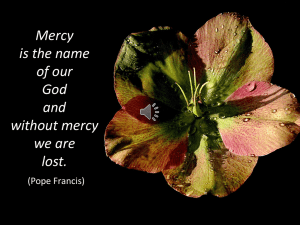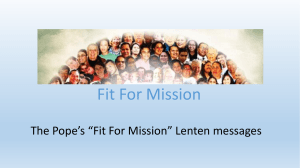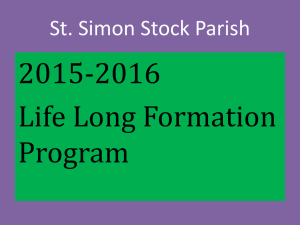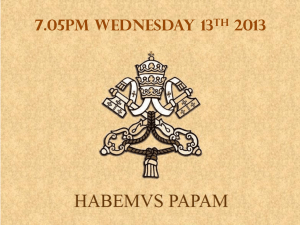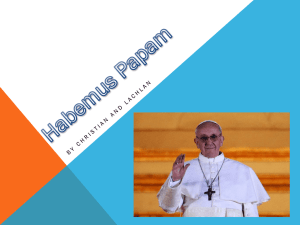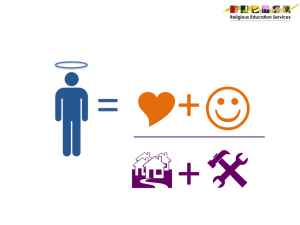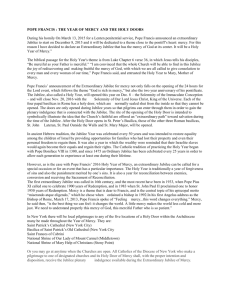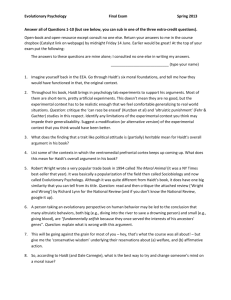How Do We Judge Pope Francis` `Who Am I to
advertisement
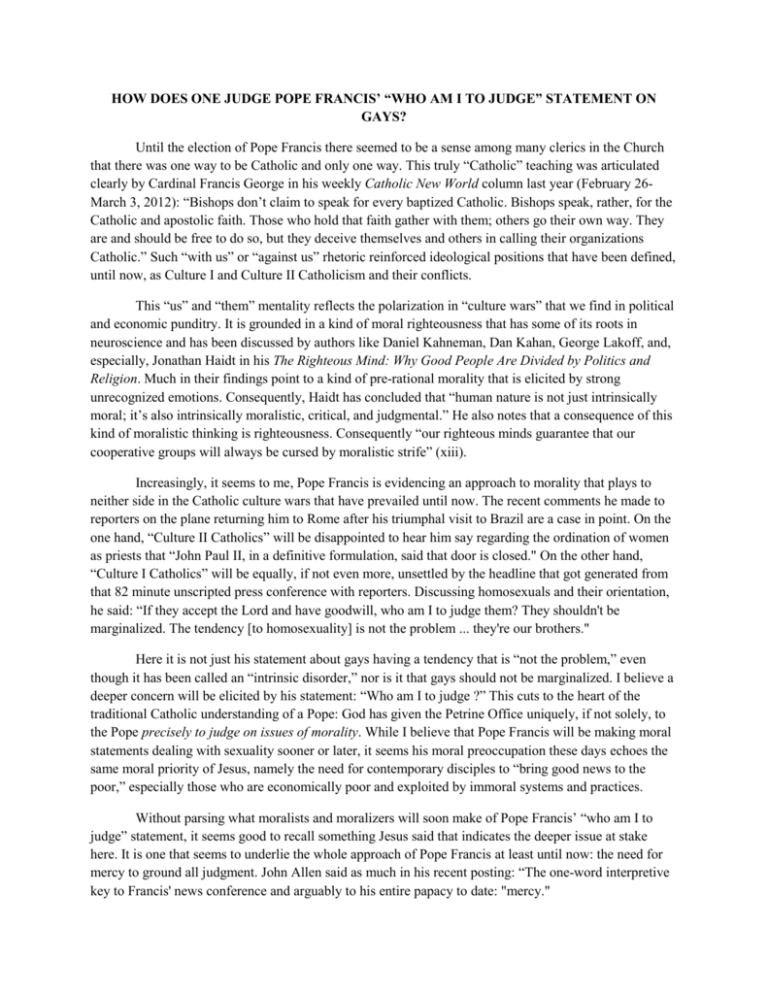
HOW DOES ONE JUDGE POPE FRANCIS’ “WHO AM I TO JUDGE” STATEMENT ON GAYS? Until the election of Pope Francis there seemed to be a sense among many clerics in the Church that there was one way to be Catholic and only one way. This truly “Catholic” teaching was articulated clearly by Cardinal Francis George in his weekly Catholic New World column last year (February 26March 3, 2012): “Bishops don’t claim to speak for every baptized Catholic. Bishops speak, rather, for the Catholic and apostolic faith. Those who hold that faith gather with them; others go their own way. They are and should be free to do so, but they deceive themselves and others in calling their organizations Catholic.” Such “with us” or “against us” rhetoric reinforced ideological positions that have been defined, until now, as Culture I and Culture II Catholicism and their conflicts. This “us” and “them” mentality reflects the polarization in “culture wars” that we find in political and economic punditry. It is grounded in a kind of moral righteousness that has some of its roots in neuroscience and has been discussed by authors like Daniel Kahneman, Dan Kahan, George Lakoff, and, especially, Jonathan Haidt in his The Righteous Mind: Why Good People Are Divided by Politics and Religion. Much in their findings point to a kind of pre-rational morality that is elicited by strong unrecognized emotions. Consequently, Haidt has concluded that “human nature is not just intrinsically moral; it’s also intrinsically moralistic, critical, and judgmental.” He also notes that a consequence of this kind of moralistic thinking is righteousness. Consequently “our righteous minds guarantee that our cooperative groups will always be cursed by moralistic strife” (xiii). Increasingly, it seems to me, Pope Francis is evidencing an approach to morality that plays to neither side in the Catholic culture wars that have prevailed until now. The recent comments he made to reporters on the plane returning him to Rome after his triumphal visit to Brazil are a case in point. On the one hand, “Culture II Catholics” will be disappointed to hear him say regarding the ordination of women as priests that “John Paul II, in a definitive formulation, said that door is closed." On the other hand, “Culture I Catholics” will be equally, if not even more, unsettled by the headline that got generated from that 82 minute unscripted press conference with reporters. Discussing homosexuals and their orientation, he said: “If they accept the Lord and have goodwill, who am I to judge them? They shouldn't be marginalized. The tendency [to homosexuality] is not the problem ... they're our brothers." Here it is not just his statement about gays having a tendency that is “not the problem,” even though it has been called an “intrinsic disorder,” nor is it that gays should not be marginalized. I believe a deeper concern will be elicited by his statement: “Who am I to judge ?” This cuts to the heart of the traditional Catholic understanding of a Pope: God has given the Petrine Office uniquely, if not solely, to the Pope precisely to judge on issues of morality. While I believe that Pope Francis will be making moral statements dealing with sexuality sooner or later, it seems his moral preoccupation these days echoes the same moral priority of Jesus, namely the need for contemporary disciples to “bring good news to the poor,” especially those who are economically poor and exploited by immoral systems and practices. Without parsing what moralists and moralizers will soon make of Pope Francis’ “who am I to judge” statement, it seems good to recall something Jesus said that indicates the deeper issue at stake here. It is one that seems to underlie the whole approach of Pope Francis at least until now: the need for mercy to ground all judgment. John Allen said as much in his recent posting: “The one-word interpretive key to Francis' news conference and arguably to his entire papacy to date: "mercy." With his stress on mercy, Pope Francis seems to echo Jesus’ challenge to all his disciples to judge others in the way we want to be judged ourselves (Mt. 7:1-2). Indeed, as James, arguably Jesus’ first Apostle to die for his faith, wrote in his Epistle: “Judgment will be without mercy to anyone who has shown no mercy; mercy triumphs over judgment” (2:13). Thus far, with his stress on mercy, Pope Francis has found a way to rise above the moral polarities that have dominated discussions (or the lack thereof, due to fear) in the Catholic Church for so much time in the last two pontificates of Popes John Paul II and Benedict XVI. In the process he mercifully seems to be reflecting the biblical figure of Sophia or Wisdom. He also seems to be modeling “the take-home message of the book” written by Jonathan Haidt. Haidt writes that everyone needs to realize “that we are all self-righteous hypocrites.” To reinforce this statement, Haidt recalls the powerful words of Jesus: “Why do you see the speck in your neighbor’s eye, but do not notice the log in your own eye? . . . You hypocrite, first take the log out of your own eye, and then you will see clearly to take the speck out of your neighbor’s eye. (Matthew 7:3-5 [p. xvi]). Truly, if all of us would find ways to rise above our theological and liturgical polarities and return to mercy grounding all our discussions and all our Eucharistic sacrifices, we just might finding ourselves helping bring about a new epoch of mercy in the Church and wider world. Michael Crosby is a Capuchin Franciscan priest. He is author of Repair My House: Becoming a ‘Kindom’ Catholic.
